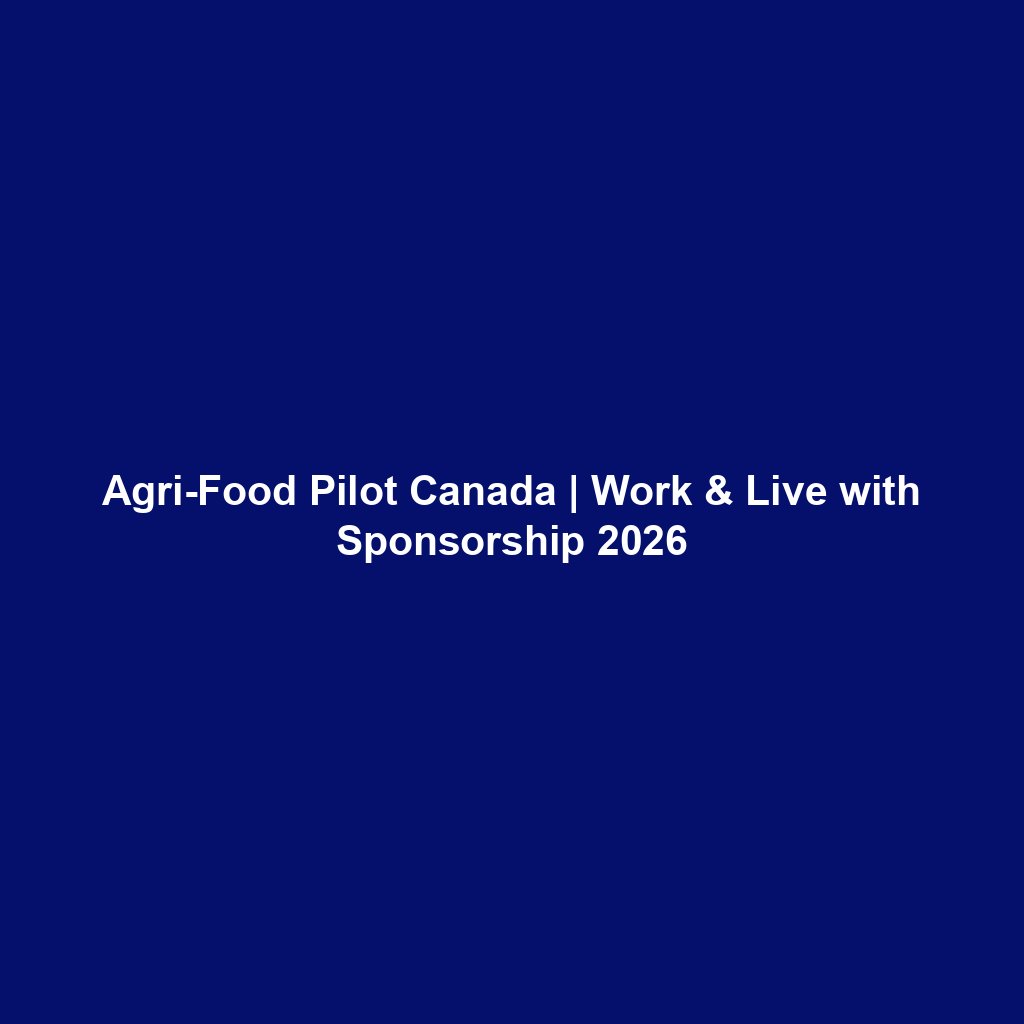Looking to work in Canada’s agriculture or food processing industry? The Agri-Food Pilot 2026 offers a pathway to permanent residency for foreign workers with job offers in specific industries. Learn how to apply, eligible jobs, and sponsorship opportunities.
Canada’s agricultural and food processing sectors are essential to the national economy, yet they face chronic labor shortages—especially in meat processing, mushroom production, and greenhouse operations. To address this gap and help foreign workers secure a better future, the Canadian government introduced the Agri-Food Pilot, a program that provides a pathway to permanent residency for workers in key agri-food industries.
As we move into 2026, this pilot program continues to be a golden opportunity for foreign nationals looking for long-term stability, Canadian experience, and employer sponsorship. Whether you’re already in Canada or planning to move, the Agri-Food Pilot could be your chance to work, live, and settle in Canada with full support from employers across the country.
This post offers a complete guide to the Agri-Food Pilot Canada 2026, including eligible jobs, application process, employer sponsorship options, and how you can start your journey to permanent residency in Canada.
Key Highlights
- 🇨🇦 The Agri-Food Pilot offers permanent residency (PR) pathways for foreign workers in agriculture and food production.
- ✅ Applicants must have a valid job offer and one year of work experience in Canada.
- 🧑🌾 Eligible industries include meat processing, mushroom farming, greenhouses, and livestock.
- 📝 Language and educational requirements are minimal, making it ideal for unskilled or semi-skilled workers.
- 💼 Employers can provide visa sponsorship under the Temporary Foreign Worker Program (TFWP).
What is the Agri-Food Pilot Program?
Launched in 2020, the Agri-Food Pilot was designed to attract and retain experienced foreign workers in specific sectors that face persistent labor shortages. Unlike temporary work permits, this pilot provides a direct route to permanent residency for eligible foreign workers.
It’s different from most immigration pathways because it’s occupation and industry-specific, targeting sectors that are crucial to Canada’s food supply chain.
Eligible Industries Under the Agri-Food Pilot
The pilot focuses on the following sectors:
- Meat Product Manufacturing (e.g., butchers, food processing workers)
- Greenhouse, Nursery, and Floriculture Production (e.g., mushroom pickers, greenhouse workers)
- Animal Production (excluding aquaculture) (e.g., general farm workers, livestock laborers)
These industries often require manual labor, making them suitable for semi-skilled or unskilled foreign workers who want a long-term opportunity in Canada.
Top Eligible Occupations in 2026
| S/N | Job Title | NOC Code | Industry |
|---|---|---|---|
| 1 | Industrial Butchers and Meat Cutters | 73401 | Meat Product Manufacturing |
| 2 | Food Processing Labourers | 95106 | Meat Product Manufacturing |
| 3 | General Farm Workers | 85100 | Animal Production |
| 4 | Harvesting Labourers | 85101 | Greenhouse, Nursery & Floriculture |
| 5 | Farm Supervisors and Specialized Workers | 82030 | Livestock & Greenhouse Operations |
| 6 | Livestock Labourers | 85103 | Animal Production |
✅ These occupations are eligible for PR under the Agri-Food Pilot once work experience and other criteria are met.
Agri-Food Pilot 2026 Eligibility Requirements
To apply under the Agri-Food Pilot in 2026, you must meet the following criteria:
1. Work Experience
You must have at least 1 year of full-time, non-seasonal work experience in one of the eligible occupations in Canada under a valid work permit.
2. Job Offer
You must have a valid, full-time, non-seasonal job offer from a Canadian employer in one of the eligible industries. The offer must be:
- Outside of Quebec
- For a position in one of the qualifying industries
- Valid until you become a permanent resident
3. Language Proficiency
A Canadian Language Benchmark (CLB) level 4 in either English or French is required.
4. Education
Minimum high school diploma (Canadian equivalent) is necessary. If you studied outside Canada, you’ll need an Educational Credential Assessment (ECA).
5. Settlement Funds
Unless you are already working in Canada, you’ll need to show that you have enough money to support yourself and your family members upon arrival.
📌 Check current funds required: IRCC Proof of Funds
How to Apply for the Agri-Food Pilot in 2026
Step 1: Secure a Job Offer
Start by applying for jobs in the eligible sectors. Use Canadian job portals and apply only to employers who can offer non-seasonal jobs. Examples include:
- Job Bank Canada
- Indeed Canada
- AgCareers Canada
- Workvantage International Workforce
- CanadaVisa Job Board
Tip: Use keywords like “Agri-Food Pilot eligible” or “LMIA-approved” in your search.
Step 2: Get a Work Permit
Most candidates will first come to Canada under the Temporary Foreign Worker Program (TFWP). The employer must obtain a Labour Market Impact Assessment (LMIA) that proves they couldn’t fill the position locally.
Step 3: Complete One Year of Work in Canada
You must complete at least 12 months of full-time, non-seasonal work in an eligible job under a valid work permit.
Step 4: Gather Required Documents
These typically include:
- Valid job offer letter
- Proof of work experience
- Educational Credential Assessment (ECA)
- Language test results (IELTS/TEF)
- Proof of settlement funds
- Passport and identification
Step 5: Submit Your PR Application
Apply online via the IRCC portal. The processing time is usually 6 to 12 months.
📍 Submit here: Canada PR Application
Benefits of the Agri-Food Pilot
- Direct pathway to permanent residency
- No need for high-level education or advanced language skills
- Family sponsorship available after PR
- Option to work while applying
- Clear path to Canadian citizenship
This program is ideal for people seeking long-term settlement in Canada with minimal education or experience barriers. It’s also a rare federal program that targets specific job roles rather than provinces, making it accessible from anywhere in Canada (except Quebec).
Conclusion: Don’t Miss the Agri-Food Pilot 2026
The Agri-Food Pilot is not just another immigration program—it’s a life-changing opportunity for foreign workers seeking stability and permanent residency in Canada. It removes many of the barriers faced by low-skilled workers and opens the door to a future of security, family reunification, and career growth.
If you’re ready to work hard, contribute to Canada’s essential industries, and build a better life, this program is for you.
👉 Start applying for Agri-Food Pilot eligible jobs today. Your future in Canada is closer than you think.
FAQs
1. Can I apply for the Agri-Food Pilot from outside Canada?
No. You must have at least 1 year of full-time work experience in Canada in one of the eligible jobs before applying for permanent residency under this pilot.
2. Do I need an LMIA to apply?
Yes. Your employer needs to obtain a Labour Market Impact Assessment (LMIA) to hire you under the TFWP before you can begin gaining your qualifying work experience.
3. Is Quebec included in the Agri-Food Pilot?
No. The Agri-Food Pilot does not apply to jobs or job offers in Quebec.
4. What is the required language score for Agri-Food Pilot?
You need a minimum CLB 4 in English or French. This is a basic language requirement and lower than many other immigration programs.
5. Can I include my family in the application?
Yes. Once you become a permanent resident, you can sponsor your spouse and children to join you in Canada.






